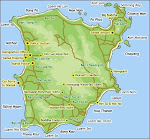
No tuk-tuks on Koh Samui
A strong taxi operators' cartel (some would say mafia) have, so far, managed to prevent the introduction of tuk-tuks to the island. Given the noise and pollution we have seen they can create in Bangkok, I don't know that this is necessarily a bad thing, but it has reduced the options for non-driving drinkers and has certainly strengthened the grip that taxi operators enjoy on point-to-point fares. Samui's taxis display the familiar taxi meter sign on their roof, but drivers refuse to use a meter and consequently are able to charge the highest fares in Thailand. It's important that you agree a price for your journey with the driver, before you go.
For the witless and desperate, motorcycle taxies are also available. The riders are distinguished by yellow coloured tabards. As with four-wheeled taxis, negotiate a price before setting off. Top tip? Don't! If you must - focus Zen like concentration on being as low a centre of gravity as possible. Don't hold the rider around the waist. With hands behind your back, grip onto the bar at the back of the seat or press your open palms down flat on your thighs. Don't try to sit upright when the bike is turning or racing around a bend; mimic every leaning movement of the bike and rider. Good luck!


Given the limited transport options it's not surprising that many visitors choose to rent a bike or car to get around. Unless you're an experienced biker the best option is to rent a car.
There are dozens, possibly hundreds, of small family-owned rental outfits on Samui, as well as most of the big name international car hire operators, such as Avis and Budget. Mobility in its most basic four-wheel and popular form, among visitors, is the Suzuki Jeep, costing from around Baht 700 (US$ 20)/day, depending on season. Bigger, safer, more comfortable options from Toyota and Honda are available at two or three times this price for those that don't mind spending more on their transport, than they do on their accommodation.
In theory, you should possess an international driving licence, but a lack of one has never denied me the dubious convenience of hiring one of these ubiquitous pieces of crap.
Bikes, typically 100 or 125cc Hondas or Suzuki are available everywhere for around Baht 125 - 175/day. Newer, fully automatic versions are offered for a bit more. But whatever the model, they share equally in lethality and the potential for self-harm by inexperienced riders.
Thailand has one of the World's worst road accident rates and Samui has the highest accident rate in Thailand. The island's poorly maintained, steep, sandy roads combine with a largely untrained biking population to result in most accidents being caused by motorcycles. And the majority of these involve foreign visitors.
Novice bikers seriously need to keep their wits about themselves to remain unscathed. The opportunities to sustain injuries on a motorcycle are not limited to traffic accidents. Most injuries are self-inflicted, with the notorious Samui Tattoo, a burn to the right calf from a hot exhaust pipe, caused as a result of de-mounting on the right side of the bike, the most common.
Unusually good advice from the Highway Department
If you still intend to take to the road, note that insurance doesn't exist for motorbikes on Samui and whomever was the cause of damage in an accident, it is always the foreigner who will pay. Similarly 'bargain' car hire deals are a risky proposition. Mainly it's the international rental operators that will include comprehensive coverage in their (more expensive) rates.
Remember to drive on the left, and bikers: you must wear a helmet or risk a fine of Baht 500.
Baan Bophut reception will show you what's on offer and try to get you the best deal, including collection and drop-off at the hotel.
Safe motoring















No comments:
Post a Comment